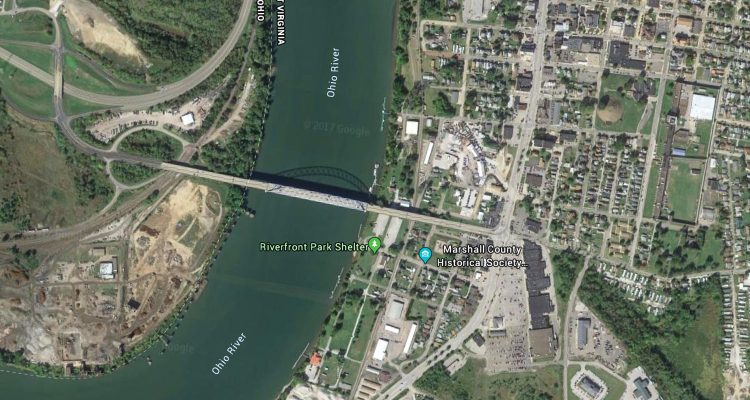(Editor’s Note: This is the second of two reports that will update Weelunk readers on the current status of the proposal to extend U.S. Interstate 68 from the Morgantown area to Moundsville.)
There are obstacles to consider like farms and streams and gullies and maybe even a gorge, but Marshall County Commissioner Bob Miller does not view any of the terrain as roadblocks to the extension of Interstate 68 from Morgantown to Moundsville.
After all, it was important enough to connect two sides of West Virginia with the New River Gorge Bridge, and the span has become one of the state’s star tourist attractions ever since. Constructed between June 1974 and October 1977, the steel-arch bridge carried a $37 million price tag, one that would inflate to $112.5 million in today’s dollars, according to the federal government’s inflation tables.
The record-setting span and its 3,030 feet welcome an average of 16,000 motorists per day, and for locals it shortened a 45-minute drive to a 45-second sprint over the New River.
“I don’t see anything that large being needed with the extension of I-68, but I am sure the construction of bridges would have to take place,” said Miller, one of three Marshall County commissioners. “That’s where the design and environmental impact study would come into play, and I’ve already been told that the process could take as long as three-to-five years for that study to be completed.
“I would hope that the process could be expedited, but we do have to be sure that the construction would not harm the environment,” he said. “I would expect the same kind of terrain and issues that were encountered when other interstates were constructed in the state to be concerns this time around, too, and we know those were handled in the proper way.”
Seven different federal interstates weaved their way through the Mountain States, including I-70 and I-470 in Ohio County, and all are heavily traveled, according to Gus Suwaid with the W.Va. Division of Highways. Miller is confident the proposed extension of I-68 would attract just as much traffic as those interstates do now.
“In the beginning of this overall conversation with people from the Northern Panhandle, it was all about getting to Mountaineer football faster,” he admitted. “But then we saw the massive amount of development that’s taken place here in Marshall County, and that conversation took a different direction.
“Now, the talk is about the industry we already have here and the industry that could potentially be developed here. As a county commissioner, my job is not to create jobs, and any politician or candidate that claims that just isn’t being honest,” Miller continued. “Instead, a commissioner’s job is to help create an environment that is attractive to the private sector so there’s a better chance for economic development to take place. That’s the true role of government on all levels.”
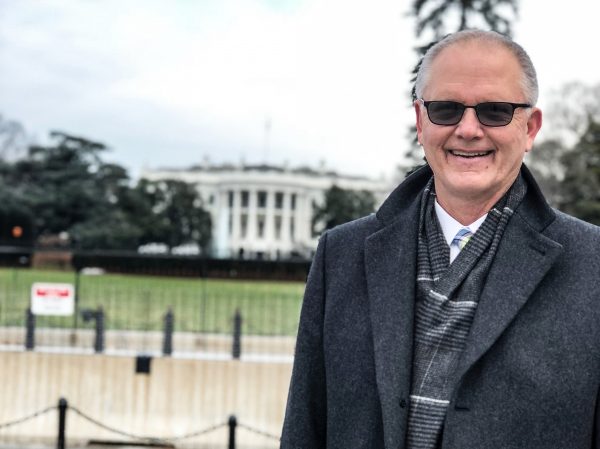
The White House
The Trump Administration began inviting county and state officials to Washington, D.C., soon after the 45th American president took office in January 2017, and Miller was one of more than 50 West Virginia representatives to make the trip. His trek to the nation’s capital led him to Wheeling to access I-70 eastbound, then I-79 southbound in Washington, Pa., and then I-68 outside of Morgantown.
“I had no idea what to expect in D.C., none whatsoever, but I wasn’t going to pass up an opportunity to visit officials with the president’s administration,” Miller said. “And yes, the project was on my mind during the trip there, and that’s because of how I had to travel to get there.
“Once we all arrived, we found out that we had been invited there to attend a seminar that involved the best ways to communicate with the president’s aides in governmental affairs,” he said. “During the visit is when I met Bill Kirkland, who was working as an assistant to the president and was the deputy director of intergovernmental affairs, and he told me then that if I had any ideas for my area that the president might be able to help with, that I should send him an email about it.”
So that’s what Miller did the day after returning to Marshall County.
“It was a brief email, but Bill returned a note back quickly and his message was that we need to make the I-68 project happen, and he invited me to sit down with him in Washington, D.C. so I met with him on Nov. 8. Now, we are organizing for the second meeting that will include others from the region that would be impacted by this highway,” Miller reported. “At this point, I am not sure when the second meeting will take place, but I know the interest remains in the White House.
“It’s going to be a long process, but at least we are involved with that conversation, and if the president and our federal lawmakers do move forward with a $1 trillion infrastructure bill, then who knows? This could be included if we communicate,” he said. “I cannot say that we will get any further with it than we are now, but at least we progressed to this point.”
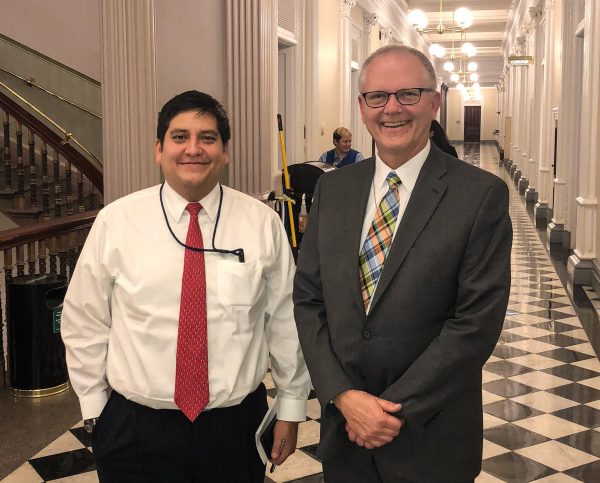
Miller continues speaking with elected officials in the Northern Panhandle and in East Ohio, too, to gage interest in attending future meetings with Kirkland and other White House officials. John Gruzinksas, a colleague of Miller’s on the Marshall County Commission, would welcome the chance to attend one of several of the gatherings.
“When I first came to Marshall County as a West Virginia State Trooper, the veterans told me about three things very quickly,” he recalled. “One thing was about the Krishnas, another was the West Virginia Pen, and the third thing was the extension project involving Interstate 68 coming to Moundsville.
“It’s something I’ve thought a lot about, and I think it would be a great thing for Marshall County,” Gruzinksas said. “Now, will I ever see it? Probably not, but I would enjoy seeing it get started. No one knows right now how long it would take or how much it would cost, but I think it’s a good conversation, so I would definitely to Washington, D.C. to talk about it.”
Along with Gruzinksas, Miller plans to invite representatives of organized labor and from the construction industry as well as officials from areas that would be impacted the most by the construction of the extension and the economic impact once completed.
“Mr. Kirkland has told me that he wants to keep the meetings small with about four people plus me,” Miller said. “I really want everyone involved to be heard by the folks at the White House, so if that means several meetings, I’m in favor.
“I would love for this project to be part of the conversation in the White House when they discuss the goals with the president’s infrastructure initiative so this road will at least be considered,” he said. “All I am attempting to do is to make it a possibility.”
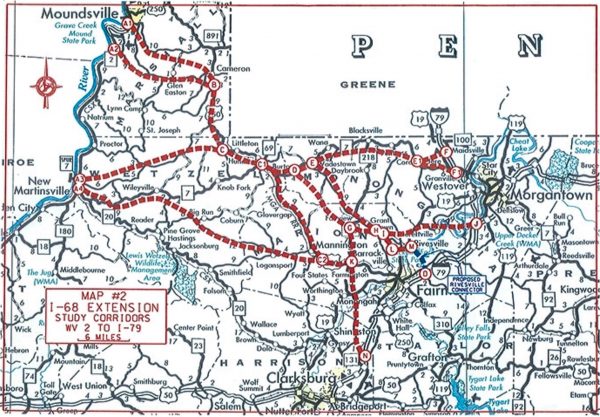
Just a Dream?
“It’s really an amazing thing when you realize how much is manufactured by the plastics industry, and all a person has to do is walk into any room and take a good look around,” Miller said while discussing the possible ethane cracker plant proposed across the Ohio River from Moundsville. “Everything from the case for your smartphone to the bottles we drink water out of, and that’s just two of thousands of examples.
“Just look around where you are right now,” he said. “Count how many things you see are manufactured using plastic. If you take the time to notice, I think you’ll be surprised.”
But, just as it’s still unknown whether or not officials of PTT Global America will construct the $6 billion petrochemical facility in Belmont County, no one knows how much traction Miller will achieve with federal or state officials. With the West Virginia Legislature now in its 60-day regular session, the county commissioner was pleased to learn this week that Sen. Greg Boso (R-11) has sponsored the proposed legislation and a judicial resolution that Miller developed last year.
What was Senate Bill 210 is now SB 295, and the Senate Judicial Resolution is now SJR8 instead of SJR4. If both are approved, state law would allow property tax dollars to flow toward economic development instead of public education.
“But remember; this only concerns the new dollars that Marshall County will receive once the cracker bill expires and the county coffers begin collecting property taxes from the gas and oil development that has taken place,” Miller reminded. “What I have proposed will not take any money that our public-school system is utilizing right now. No matter, our public schools will have the funds they need to operate and continue to educate at a very high level.
“I have been promised by members of the House of Delegates that this legislation would move forward, and from what I understand, Sen. (Charles) Clements (R-2) would love to see this legislation be passed during the first 30 days of the regular session, and I am very optimistic about that prospect,” he said. “It’s an important first step to take if this road is ever going to be built using these funding solutions.”
And if the legislation and resolution are not approved?
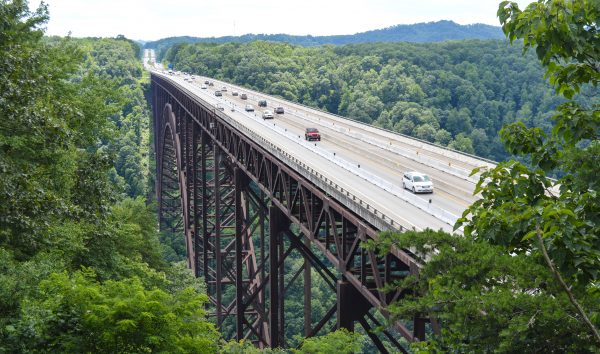
“I know right now this project is a pretty deep hypothetical on all levels because of the billions of dollars it would take to make it happen,” said Suwaid, now entering his third year as district engineer. “Now, if the federal government does pass a massive infrastructure piece of legislation like has been mentioned, then that’s a different story because that may be the only way that the project happens.
“I can see it as a three-partnership project with the federal and state government funding along with funding coming from the private sector that would most benefit from such an interstate, and I know that’s part of the commissioner’s proposal,” he continued. “Without the private sector contribution, I would be worried about the amount of state dollars that would go into that because of how much else we are concerned about at this time.”
Will residents of Marshall County ever see the extension project initiated? Completed? Some believe the president’s infrastructure push should concentrate on rehabilitation instead of new-road development while others feel such a project would provide an enormous economic impact and at least should be considered.
Miller is a member of the latter group, of course.
“I believe we will it happen. Now, without the gas and oil industry in this area, this conversation would not be taking place, but it’s here,” Miller said. “I know some people are not very optimistic, but I am.
“I know PTT Global has delayed its decision, but with Shell building their ethane cracker in Beaver County, the petrochemical industry is here, and it’s widely known that such a facility will benefit the economies in a 250-mile radius,” he said. “I hope, at least, to see it get started so that generations in the future can reap the benefits.”


